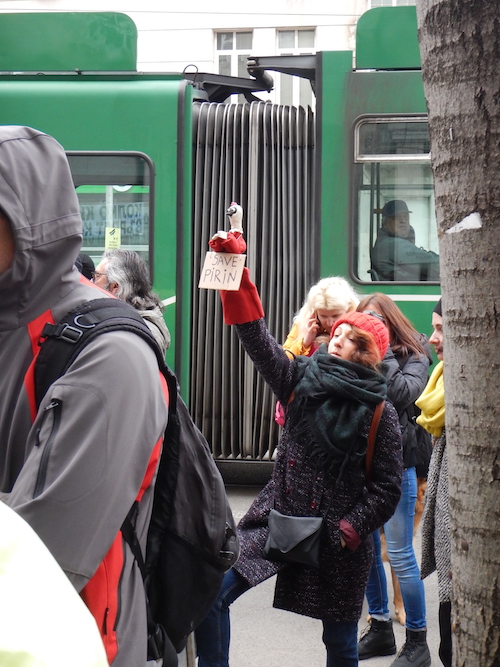 Sofia Organizing is somewhere on the spectrum between craft, trade, and art, so to keep even, much less ahead, of developments in the work, it’s important to pick up tips and examine the “nuts and bolts” wherever you can. Conversations and observations in Bulgaria were providing me a laundry list of lessons.
Sofia Organizing is somewhere on the spectrum between craft, trade, and art, so to keep even, much less ahead, of developments in the work, it’s important to pick up tips and examine the “nuts and bolts” wherever you can. Conversations and observations in Bulgaria were providing me a laundry list of lessons.

On a lunch break I was able to observe a demonstration in front of the Environment building in Sofia of between 150 and 200 protesting an attempted development of a ski resort in the mountains and calling for the government to Save Pirin. The organizers had fabricated a large sign as the focus of the protest which was quite elaborately constructed, partially on the site, where the pieces were assembled, but individual protestors were allowed their own creativity. One had made a hand puppet, which drew a lot of attention, clapping in unison with the crowd’s chants as a rooster with a Save Pirin sign. Another was in a green getup that ridiculed the rich developer who was taking a loan from his own bank to finance the project. Either the signs were homemade or didn’t exist.

I was fascinated as well by the sound system. I can remember our own routine of borrowing a shopping cart and a car battery to hook up a speaker and microphone for marches and demonstrations. Here I found a modification of high tech sophistication, complete with its own portable generator, portable hand microphones, giant speakers on stands, and enough gear that I thought any minute we might be broadcasting a local radio show, all of which had been approved by police permit, which was equally surprising. Quite impressive.

Later in the afternoon, I spent a fascinating couple of hours with Atanas Sharkov, who was not only a tech and app developer, including for the very popular, Taxistars, used by independent drivers to compete with Uber, but also a sparkplug behind Justice for All, a coalition that has been trying to reform the judicial system. Tactically, they had tried to introduce a referendum to get Parliament to allow a vote on their issue. The requirements were relatively low, only 5000 valid signatures, but Parliament had the power to decide whether to accept the referenda proposals, which led to easy rejection.

We talked a lot about lists, which are part of the lifeblood of organizing drives. Organizers were not allowed to retain a list of their signature signers or at least all of the information, but obviously they were able to keep a list of their petition circulators which potentially afforded a pool of volunteer organizers to deepen their national base, I felt. They mainly organized through a Facebook page where they now had 40,000 likes, almost 5000 added in the last 4 months, so a very vibrant tool. Since Atanas knew his way around the tech side, I was able to get quick affirmative answers on whether or not he had excelled the list and data matched to phone, email, and address records that could fuel an effort to build organizing committees around the country. Additionally, he was knowledgeable and skilled in the area of predictive and autodialers that could also be invaluable for direct communication to support the organizing.

Justice for All has the capability to embrace all of these tools to create a mass organization, if they were to decide to take the natural next step and go from social media to street work. Posting is fine, but doorknocking is calling their names.
This was exciting!
